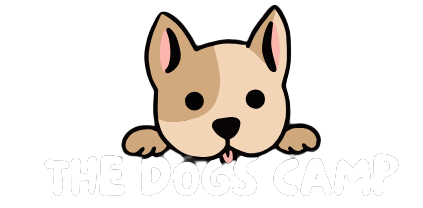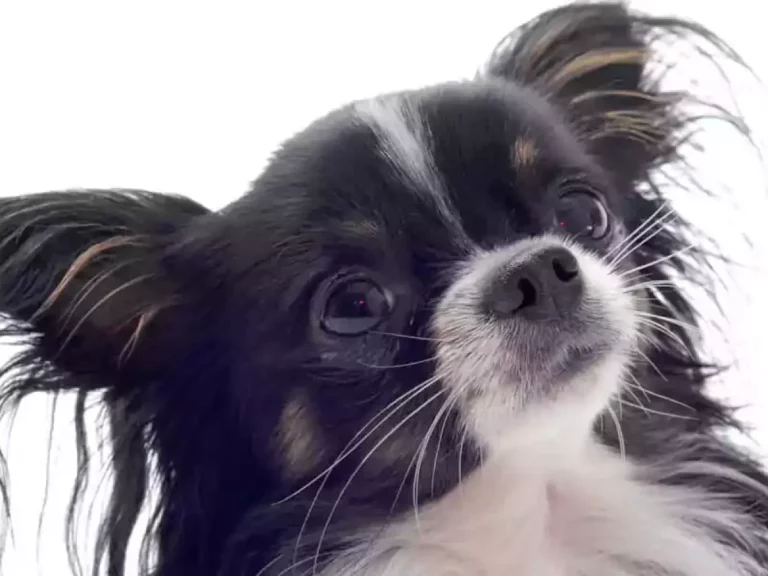Chion Dog Breed Information
The Chion is a charming hybrid, born from combining a Chihuahua and a Papillon. These small dogs bring together the best features of their parent breeds, from a range of coat colors like white and tan to the Papillon’s distinct upright ears sitting atop the Chihuahua’s small frame. Their bright eyes reflect their friendly nature, making them lovable companions.
Chions adapt well to different homes, whether a city apartment or a house with a yard, making them an excellent choice for many people. They are becoming more popular because they’re affectionate, intelligent, and usually easy to train.
Anyone thinking about getting a Chion should get to know the breed to make sure it’s the right fit for their lifestyle.
Key Takeaways
- Chions are a hybrid of Chihuahua and Papillon breeds.
- They’re adaptable and suitable for various living situations.
- Assess compatibility with the breed before deciding to own one.
Chions combine two breeds into a lovable companion with varied coats. These small dogs are affectionate, intelligent, and generally trainable. Before bringing a Chion home, ensure the breed’s traits fit your lifestyle.
Quick Facts
The Chion is a charming mix of Chihuahua and Papillon, known for its petite size and attractive appearance. These dogs combine features from both breeds, often sporting a small frame and perky ears, a nod to their Papillon heritage.
They may have coats in various shades, such as white, black, brown, or tan. Studies of the Chion have shown they’re typically healthy, but they may be prone to specific health issues like Addison’s Disease and Patellar Luxation.
Recognized by various dog registries, Chions are usually warm and faithful companions. They do need consistent grooming to keep their fur in good condition.
Overview
Despite their small size, Chions bring much energy and are known for their loving nature. These hybrid dogs come from Chihuahua and Papillon parents, leading to various coat colors that need regular grooming. They look charming with their expressive eyes and are well-suited for apartment living. Yet, these lively pets need daily physical activity, and training them to be housebroken can be tricky.
Healthwise, Chions are known for their longevity and devotion, making them a popular choice among mixed breeds. They’re recognized by groups like the ACHC and IDCR, which shows their growing popularity among dog enthusiasts.
Chion Pictures
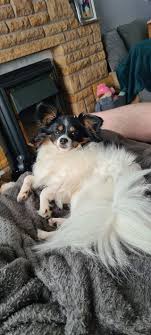
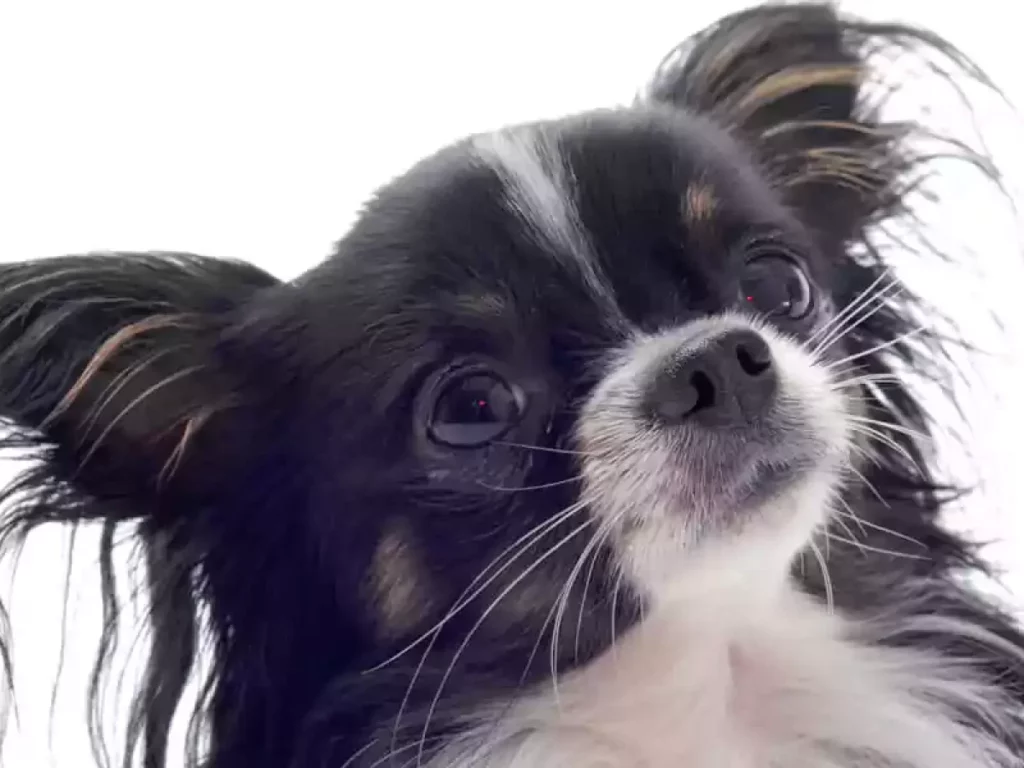
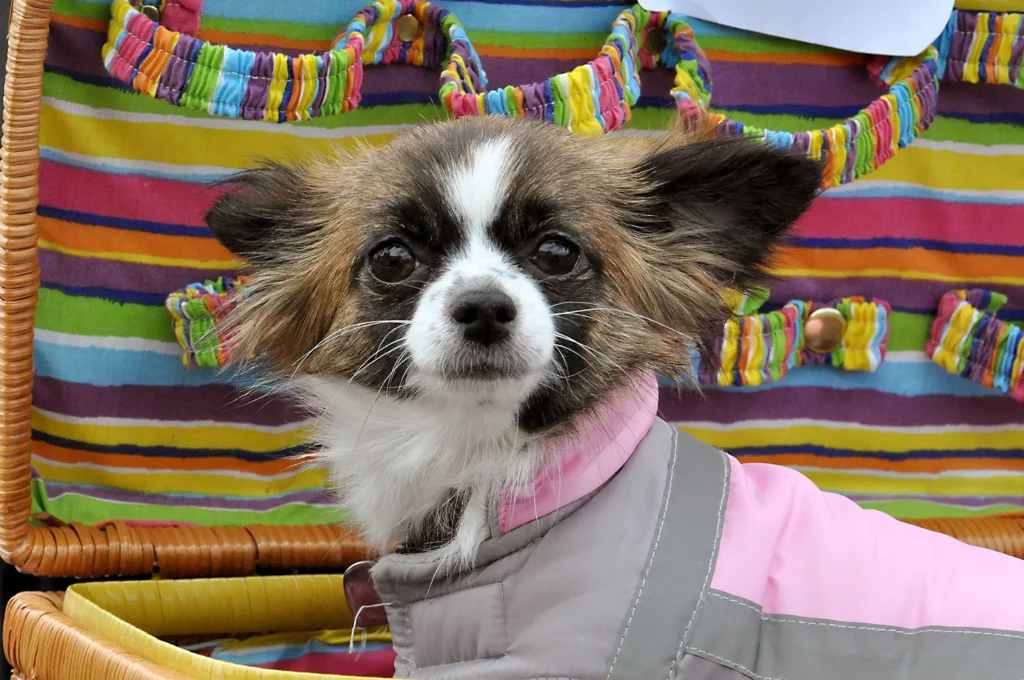
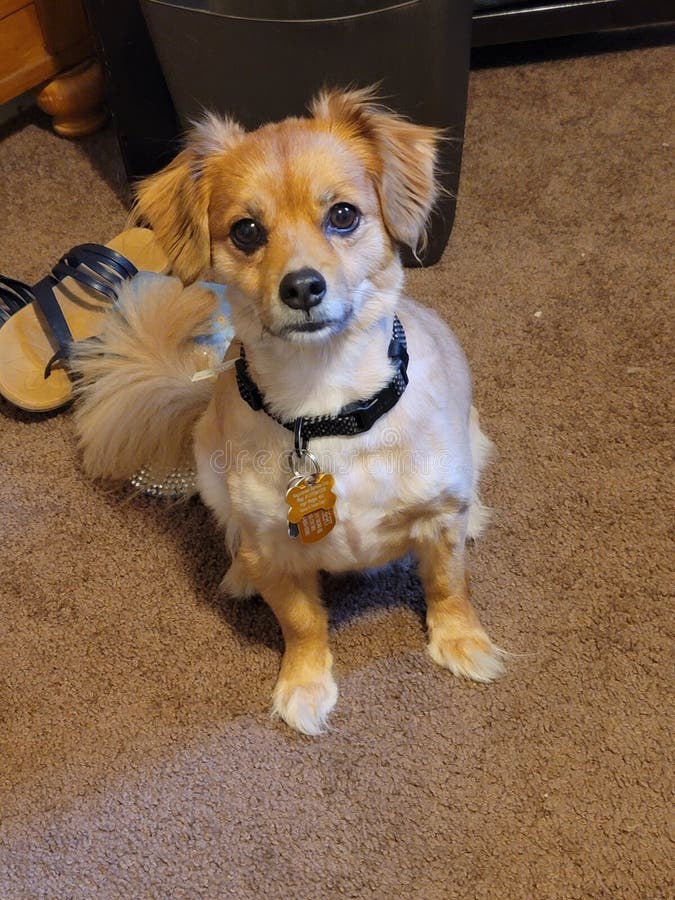
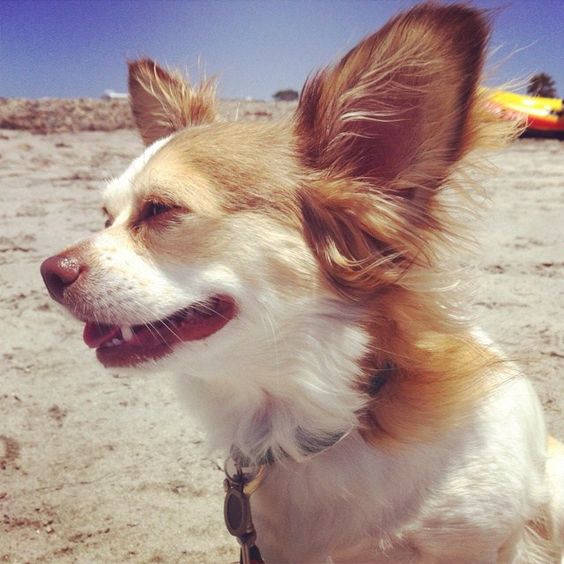
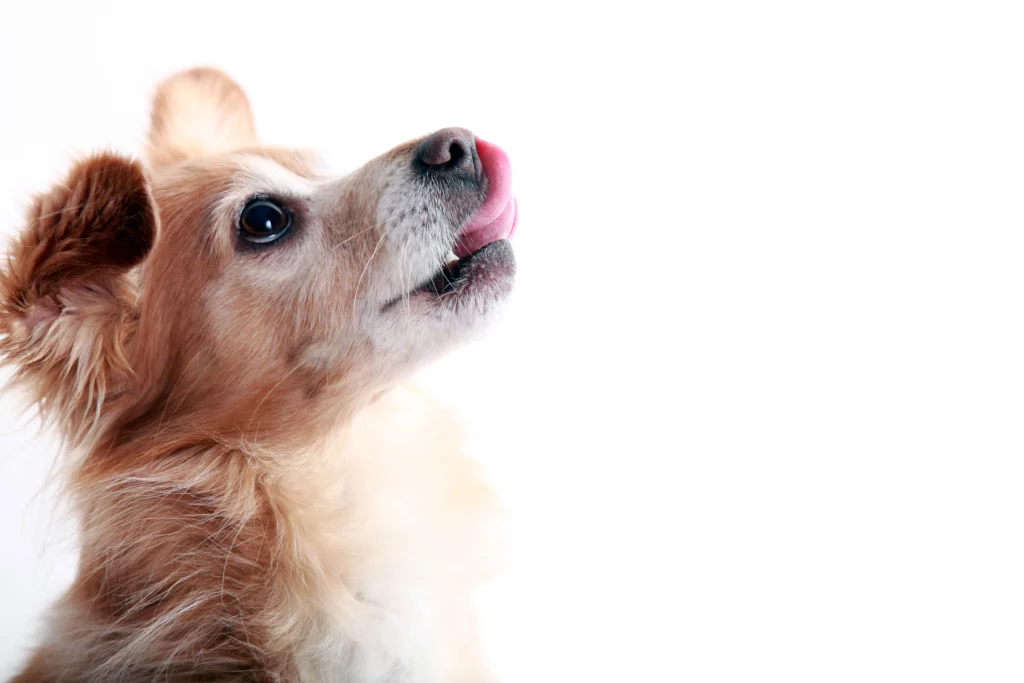
Key Traits
Chion dogs, a mix of Chihuahua and Papillon breeds, stand out with their physical and behavioral features. This hybrid dog has become famous for its combination of traits, which caters to various dog lovers.
Here’s a rundown of the Chion’s characteristics:
- Physical traits include upright ears, a small yet sturdy build, coats in various colors, and very expressive eyes.
- Behavior-wise, Chions are known for their abundant energy, amiable nature, tendency to be headstrong, challenges with housetraining, and susceptibility to dental problems.
Chions carry the petite size and expressive nature of both parent breeds. However, they also risk dental health issues, a notable concern in smaller dog breeds. They need regular activity and can be pretty headstrong, so owners should be patient and consistent with training and care.
Breed Origin & Evolution
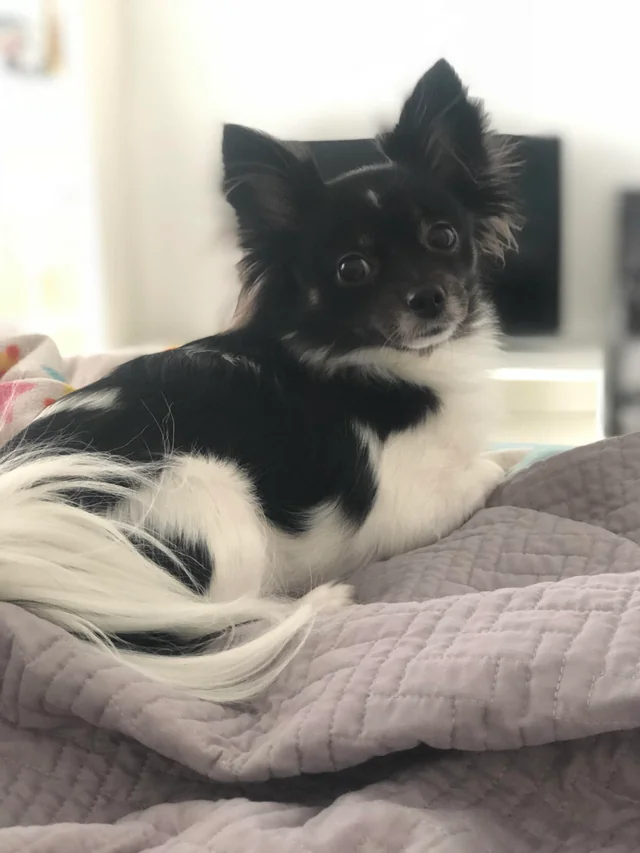
The Chion is a unique mix created intentionally by combining the Chihuahua and the Papillon traits. To fully grasp this breed’s journey, we should examine the ancestral influences that determine their behavior and looks.
We also need to consider how genetic variation affects their health and personality. Observing the changes Chions have experienced since they were first bred helps us understand their adaptations.
We’ll see how the breed may change due to deliberate breeding choices and environmental changes. This analysis gives us a detailed picture of where the Chion stands today and where it might go.
Ancestral Breed Influence
To understand the heritage of the Chion, it’s essential to look at how the Chihuahua and Papillon breeds contribute to its makeup.
The Chihuahua brings its tininess and lively nature to the mix, often influencing the Chion’s size and behavior.
On the other hand, the Papillon lends its unique butterfly ears and bright intelligence, adding these features to the Chion’s gene pool.
This fusion of parent breed traits is evident in the Chion’s appearance and personality.
Breeders carefully select and mate these dogs to maintain the preferred qualities from the Chihuahua and Papillon lineage in future Chions.
Genetic Diversity Impact
Genetic diversity plays a significant role in the development of Chion dogs, a mix between Chihuahuas and Papillons. These dogs exhibit various traits influenced by their diverse ancestry that can impact their health and behavior.
Close examination of Chion dogs’ heritage shows they may inherit health issues from both sides, such as dental problems common to Chihuahuas and a tendency for patellar luxation often seen in Papillons.
The varied genetic makeup of Chions also affects their temperament, possibly resulting in a bold and self-reliant disposition.
Understanding these genetic factors helps breeders and pet owners address potential health concerns and behavior patterns in these dogs.
Evolutionary Adaptations Observed
The Chion, a mix of Chihuahua and Papillon breeds, has developed unique traits through selective breeding. This hybrid emerged in the late 1990s as the Chihuahua gained popularity. Aiming to combine its parent breeds’ small size and lively character, the Chion stands out with its prominent triangular ears and rounded head.
These dogs are dynamic and playful but require early training to build trust with new people and excel as therapy dogs. Their adaptability is a testament to the careful breeding practices that have shaped them into loving and loyal pets.
Physical Dimensions
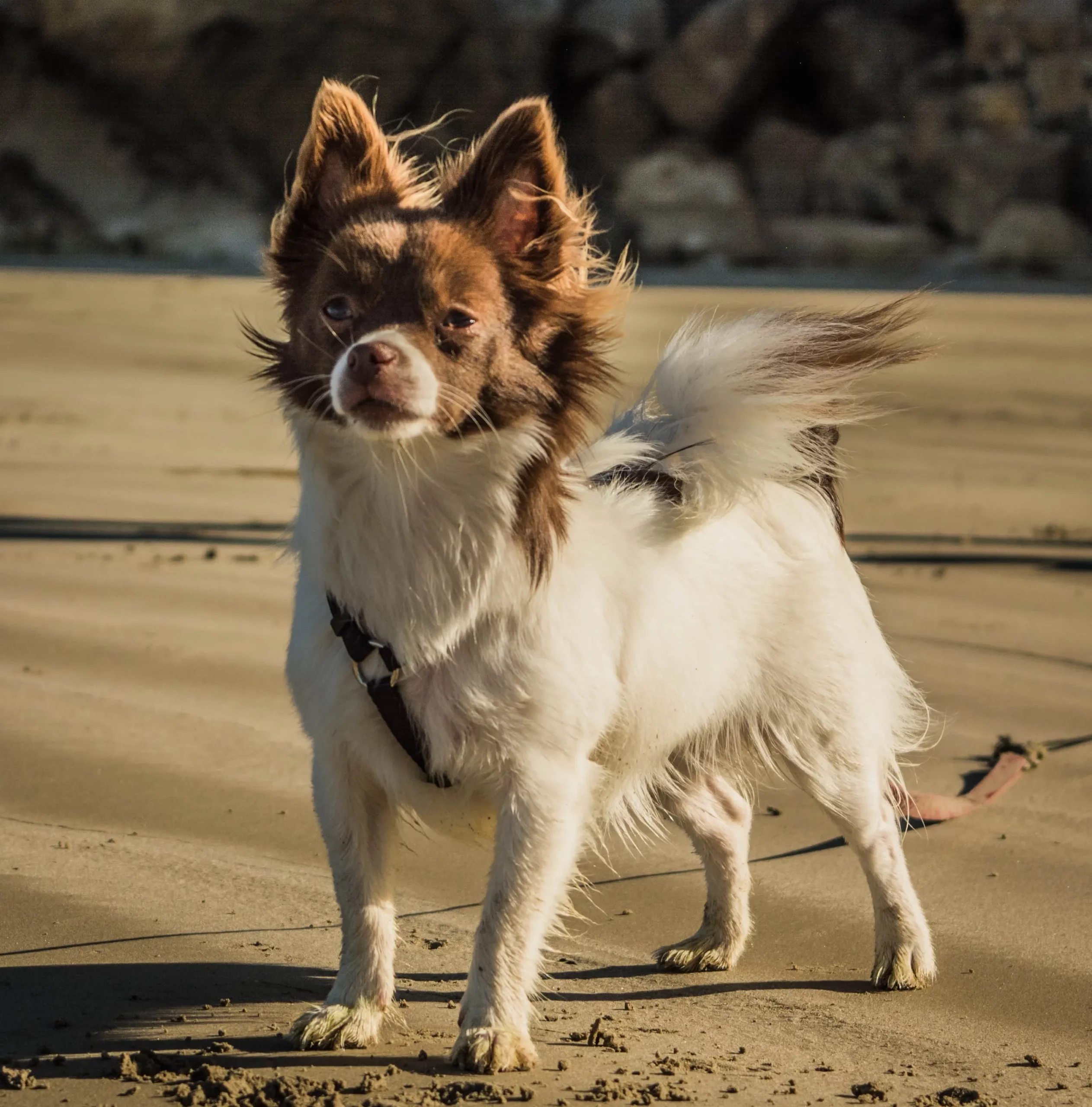
When looking at the size of a Chion dog, their mixed heritage plays a big part in what to expect. Adults usually weigh between 2 and 4 kilograms, which shows they are a smaller breed. A Chion’s height, from shoulder to ground, will be around 22 to 27 centimeters.
Understanding the body shape of these dogs means considering the mix of Chihuahua and Papillon traits they inherit. Watching them grow from puppies gives insight into their development speed and adult size. This information helps future Chion owners or breeders plan for the suitable space and care these dogs need.
Chion Size Variability
Chion dogs exhibit a range of sizes due to their Chihuahua and Papillon parents. Heights typically fall between 22-27 cm and weigh 2-4 kg. These differences in size are common in small dog breeds, where genetics play a significant role. For Chions, the mix of traits from their Chihuahua and Papillon heritage means that even puppies from the same litter can look quite different in size and weight. When caring for a Chion, it’s vital to consider their size. This is important to tailor their diet and care for optimal health.
Adult Weight Range
Chion dogs, a cross between Chihuahuas and Papillons, are pretty light, usually weighing between 2 and 4 kilograms. Their small size is inherited from their parent breeds, combining the Chihuahua’s tiny build with the Papillon’s light but sturdy structure.
When choosing a Chion, future owners must consider their living space and how they’ll handle a small pet. A Chion’s weight indicates their overall health; staying within this range suggests they’re getting the proper nutrition and are likely free from health issues.
Height Measurement Standards
Chion dogs, a crossbreed of Chihuahua and Papillon, typically stand between 22 and 27 centimeters tall at their shoulders. This height range is part of what defines the breed’s appearance, combining the small size of the Chihuahua with the Papillon’s graceful structure.
Although there’s no strict standard for Chion height due to their mixed heritage, various hybrid dog organizations acknowledge the breed. When evaluating a Chion’s size, it’s best to consider the expected range and appreciate the distinctive features of these dogs.
Breed-Specific Proportions
Studying the physical traits of Canine Chions, we find a fascinating mix inherited from their Chihuahua and Papillon (papihuahua) parents. These small dogs usually stand between 22 and 27 cm tall and weigh around 2 to 4 kg, reflecting their parentage.
They’re recognized for their large triangular ears and expressive eyes, similar to their ancestors.
Energetic and playful, Chions make great pets for city dwellers living in apartments who want a small but lively dog.
The Designer Dogs Kennel Club (DDKC) has even recognized the Chion breed, showing its growing popularity among pet owners.
Growth Rate Expectations
Knowing how fast your Chion puppy grows helps you ensure they’re healthy and stay within the average size range of 22 to 27 cm tall and weighing 2 to 4 kg.
The early weeks of a Chion’s life, specifically from birth to about two months, are a time of rapid growth and shape their development. It’s essential to keep an eye on their progress, as their slender shape is a mix of Chihuahua and Papillon genes, which means they grow steadily. Good food and exercise are crucial to keeping them on the right path.
Since every Chion is a bit different, regular check-ups of their weight and height are a smart move to ensure they’re growing as they should, reflecting the distinctive qualities of their breed.
Temperament & Behavior
Understanding Chions’ temperament and behavior is critical for their development. A structured approach to their training and socialization is beneficial. It’s essential to consistently expose them to various people and animals to encourage friendly behavior. Additionally, it’s wise to put in place measures that curb aggressive tendencies and help maintain polite behavior.
Being alert to signs of anxiety in Chions can lead to timely and effective interventions. Also, a focus on the basics of obedience training is necessary for raising a responsive and well-behaved companion. This ensures they listen and follow commands, making them a joy.
Socialization Techniques
Training Chion dogs requires an approach tailored to their Chihuahua and Papillon mix traits. Use positive feedback and regular practice to encourage good behavior.
Due to their sometimes stubborn and protective nature, start obedience training early to get them used to different settings, people, and animals, which can help prevent aggression. Research shows that structured training sessions are vital for Chions to adopt proper behavior and overcome small dog syndrome.
A well-planned socialization program is critical to a well-behaved Chion and peaceful coexistence, especially in close-quarters living like apartments.
Aggression Prevention
Due to its mixed heritage, the Chion dog breed often requires careful attention to prevent aggression. This means consistently managing their temperament and teaching them appropriate behaviors.
Chions naturally protect and may bark at anything they see as a threat, so it’s necessary to use a disciplined training approach to keep any aggressive behavior under control. Studies show regular, positive reinforcement-based training sessions reduce aggression by encouraging calmness and obedience.
Early socialization is critical for Chions, who might act defensively if they feel vulnerable because of their small size. Exposing them to different environments and social settings from a young age is vital. This helps to develop a balanced temperament, making them less likely to react negatively when faced with new experiences.
Anxiety Signs
Chion dogs, known for their protective nature, often show signs of anxiety in new situations or around unfamiliar people. They might seek more attention when feeling insecure, which indicates they’re stressed. Loud barking at new faces or a solid reaction to sudden noises can reflect their stress levels. If a Chion is left on its own, it may react by becoming destructive or barking, typical behaviors of a dog with separation anxiety.
When Chions interact with other dogs, they might act aggressively, which can be a sign of social anxiety. They can also be quite stubborn when learning new things, which may be due to stress. This resistance to training can make it seem defiant, but it might be their way of expressing discomfort with the unfamiliar.
Obedience Training Essentials
Understanding Chions’ temperament and behavior is critical to creating an effective obedience training plan. These dogs are known for their high energy and sometimes stubborn nature. To keep a Chion engaged in training, activities need to be fun and positively tap into their power.
Early socialization is also vital to help them interact well with strangers, as they can be protective.
Consistency and patience are the backbone of successful house training for Chions. Since they are a small breed, teaching them how to interact with other animals and kids is important to prevent accidents safely. This ensures that their playful interactions remain safe and enjoyable for everyone.
Playfulness & Energy Levels
Chions, a mix of Chihuahua and Papillon breeds, are known for their lively and playful nature. They need an owner who can keep up with their high energy levels and zest for life.
Small in size, these dogs have a big personality, and they love to engage with their human companions. Daily walks and fun playtime are essential to keep them mentally sharp and prevent any trouble caused by boredom.
Owners should include regular activity in their routine to maintain their Chion’s happiness and good behavior.
Common Health Concerns
Caring for Chions means being proactive about their health. Owners should be aware of genetic conditions that may affect their pets and take steps to manage these risks. Regular vet visits are vital for catching any health problems early on.
Preventative care, including vaccinations and parasite control, helps keep common illnesses at bay. Paying attention to a Chion’s physical traits can also alert owners to potential issues, ensuring these little dogs stay healthy and happy.
Hereditary Disease Risks
The Chion breed, a mix of Chihuahua and Papillon, comes with a set of inherited health issues that anyone looking to own one should consider. These dogs are prone to patellar luxation, where the kneecap slips out of place, and dental problems due to their tiny mouths. They also have a higher-than-average risk of heart conditions, which means regular check-ups are vital for their heart health.
When choosing a Chion, it’s wise to ask breeders if they’ve done health screenings on their puppies. Doing so can help decrease the chances of these genetic conditions affecting your pet. Responsible breeding, along with informed ownership, can go a long way in ensuring the well-being of these charming little dogs.
Regular Veterinary Check-ups
Chions, like all dogs, need regular veterinary check-ups to stay healthy. Their unique build makes them prone to specific health issues, such as Addison’s Disease, Collapsing Trachea, and Corneal Ulceration. Taking them for routine health evaluations can catch these problems early. This is crucial because they have fragile limbs and prominent eyes that can easily get injured.
Regular vet visits can also monitor for inherited conditions like Patellar Luxation and Legg-Calve-Perthes Disease. Keeping a close eye on these issues helps ensure your Chion lives long and happy.
Preventive Health Measures
Caring for Chions requires preventive measures against health issues like patellar luxation and heart conditions. Regular dental care and weight management are crucial to keeping these dogs healthy.
Offer meals in precise amounts to prevent weight gain, which can stress their joints. Good dental hygiene helps fend off gum disease, common in small dogs and can cause other health problems.
Exercise is also crucial for Chions to support heart health and avoid cardiovascular diseases.
Tailoring these health strategies to fit a Chion’s specific needs can significantly improve their quality of life and longevity.
Maintenance & Grooming
Maintaining and grooming your Chion is vital for their health and happiness. Knowing how often to groom them is essential to keep their coat and skin in good condition. Brushing techniques that effectively remove loose hair and are gentle on your pet will make grooming a more pleasant experience for both of you. Understanding their shedding patterns and planning to deal with them will help keep your home hair-free.
Proper skin care is essential to prevent issues that can cause discomfort for your Chion. A regular grooming schedule designed for the unique needs of your Chion is the best way to ensure their coat stays healthy and remains comfortable. Remember, a well-groomed Chion is a happy Chion; a regular grooming routine is crucial.
Grooming Frequency
Grooming a Chion’s coat is essential, and doing it weekly helps manage their short to medium fur and prevent tangles. They may not need as much grooming as long-haired breeds, yet regular care is vital for their health and looks.
A solid grooming routine keeps their hair in check and minimizes the amount of hair and dander around the home. Brushing is vital to this routine as it removes dead hair and skin, improving blood flow.
Keeping up with these habits will ensure your Chion’s coat stays fresh, lowers the risk of skin problems, and keeps them looking their best.
Brushing Techniques
Brushing your Chion’s coat properly is essential to keeping it healthy and shiny. Regular brushing prevents mats and tangles and helps to manage shedding. Brushing your dog daily to deal with loose fur and keeping the coat in excellent condition is a good idea. Use gentle strokes that reach the undercoat without hurting your pet when brushing. A good practice is to use a bristle brush for the topcoat and a fine-toothed comb for sensitive areas like behind the ears and under the legs.
This careful routine makes your Chion look better and supports skin health by improving blood flow and spreading the coat’s natural oils.
Remember to use the right tools and brush gently to maintain your Chion’s coat. Regular grooming will keep your dog looking and feeling its best.
Shedding Levels
Shedding care for Chions, a blend of Chihuahua and Papillon breeds, is vital to grooming. These dogs have a combination of hair traits from both parents, which affects how much they shed. Regular brushing helps control loose hair and keeps the coat in good shape. Seasonal changes might increase shedding, so owners should adjust their grooming routine to fit these patterns. By planning a grooming schedule, owners can ensure their Chion stays comfortable and reduce allergens in their environment.
Understanding their pup’s shedding habits is vital to keeping their home hair-free and their pet’s coat healthy.
Skin Care Essentials
Proper grooming does more than control a Chion’s shedding; it’s also crucial to keeping their skin healthy. Brushing your Chion regularly helps spread their skin’s oils, giving their coat a vibrant shine and preventing irritation. Also, as you groom, you might spot early signs of skin problems like hot spots or parasites. Addressing these issues quickly is vital.
A grooming routine that fits your Chion’s needs can help prevent their hair from tangling and matting. In essence, thorough grooming plays a crucial role in both the health and the look of your Chion.
Nail Trimming Importance
Trimming your Chion’s nails regularly is a vital part of their grooming that keeps them healthy and moving comfortably. Allowing a dog’s nails to grow too long can cause pain and lead to an unnatural walking posture, which may result in long-term damage to their bones and joints.
For a small and active dog like a Chion, overgrown nails are uncomfortable and could be dangerous during energetic play since they’re not worn down naturally. That’s why from the day you welcome a Chion into your home, making nail trimming a routine part of their care is vital to avoid health issues and ensure your pet’s overall happiness.
Dietary Requirements
Chions are active little dogs whose diet plays a massive role in keeping them healthy and energetic. Finding the right mix of proteins, fats, and carbohydrates is vital to fuel their playful antics. Some Chions might have allergies or sensitivities, so offering them hypoallergenic food options is a thoughtful way to cater to their needs.
Mealtime routines are just as important for these dogs to help maintain a steady metabolism. Two to three small meals a day are generally recommended.
Also, don’t forget about their dental health; incorporating chew toys and specific foods can help keep their teeth clean and prevent dental issues.
Optimal Nutrition Balance
Chions, small yet energetic dogs, thrive on a diet tailored to their size and vitality. Their diet should include small daily meals to prevent low blood sugar, a common problem in petite breeds.
As Chions grow, their meal schedule should change from several meals daily to two servings of high-quality kibble as adults. This careful adjustment in their feeding routine supports their zest for life and helps maintain their overall well-being.
Allergy-Specific Food Choices
Chions often thrive on diets that include poultry, but if they start showing signs of food allergies, it’s time to consider special diets. These are carefully crafted to avoid common allergens found in regular dog food.
They might include unique protein sources or proteins broken down to minimize the risk of an allergic reaction.
When Chions travel, it’s essential to keep their diet consistent to avoid any flare-ups of their allergies.
Respect for the creators and distributors of these specialized diets is vital, as they provide safe and reliable food options for dogs with allergies.
Feeding Frequency Recommendations
Sticking to a regular feeding schedule is vital for the well-being of Chion puppies. These small dogs should eat three to four times a day when young to support their growth and high energy needs.
As they grow, reducing their meals to twice daily helps keep their energy steady and prevents low blood sugar, a common issue for small breeds like Chions.
Consistent meal times are suitable for their health and help establish a daily routine, which benefits their behavior and overall well-being.
